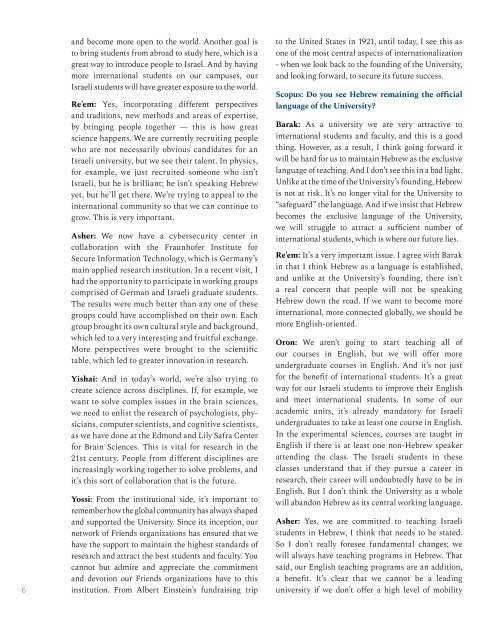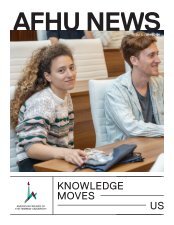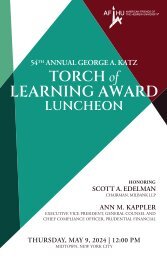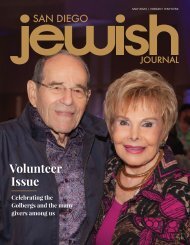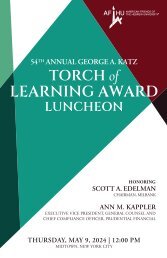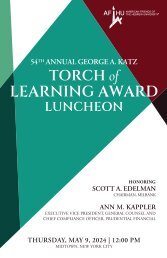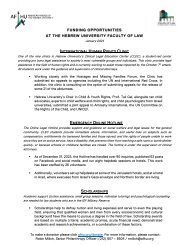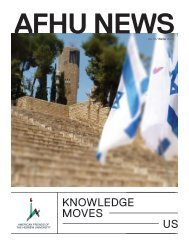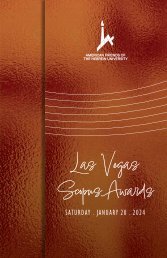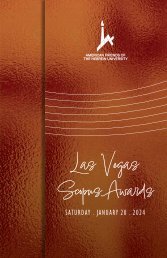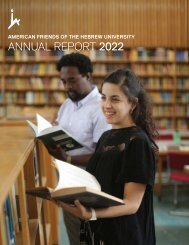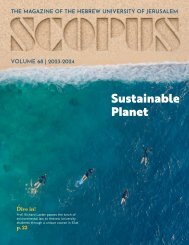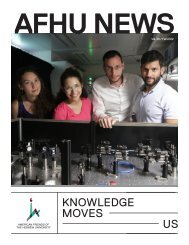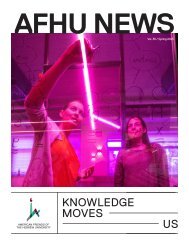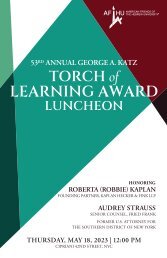Create successful ePaper yourself
Turn your PDF publications into a flip-book with our unique Google optimized e-Paper software.
and become more open to the world. Another goal is<br />
to bring students from abroad to study here, which is a<br />
great way to introduce people to Israel. And by having<br />
more international students on our campuses, our<br />
Israeli students will have greater exposure to the world.<br />
Re’em: Yes, incorporating different perspectives<br />
and traditions, new methods and areas of expertise,<br />
by bringing people together — this is how great<br />
science happens. We are currently recruiting people<br />
who are not necessarily obvious candidates for an<br />
Israeli university, but we see their talent. In physics,<br />
for example, we just recruited someone who isn’t<br />
Israeli, but he is brilliant; he isn’t speaking Hebrew<br />
yet, but he’ll get there. We’re trying to appeal to the<br />
international community so that we can continue to<br />
grow. This is very important.<br />
Asher: We now have a cybersecurity center in<br />
collaboration with the Fraunhofer Institute for<br />
Secure Information Technology, which is Germany’s<br />
main applied research institution. In a recent visit, I<br />
had the opportunity to participate in working groups<br />
comprised of German and Israeli graduate students.<br />
The results were much better than any one of these<br />
groups could have accomplished on their own. Each<br />
group brought its own cultural style and background,<br />
which led to a very interesting and fruitful exchange.<br />
More perspectives were brought to the scientific<br />
table, which led to greater innovation in research.<br />
Yishai: And in today’s world, we’re also trying to<br />
create science across disciplines. If, for example, we<br />
want to solve complex issues in the brain sciences,<br />
we need to enlist the research of psychologists, physicians,<br />
computer scientists, and cognitive scientists,<br />
as we have done at the Edmond and Lily Safra Center<br />
for Brain Sciences. This is vital for research in the<br />
21st century. People from different disciplines are<br />
increasingly working together to solve problems, and<br />
it’s this sort of collaboration that is the future.<br />
to the United States in 1921, until today, I see this as<br />
one of the most central aspects of internationalization<br />
- when we look back to the founding of the University,<br />
and looking forward, to secure its future success.<br />
<strong>Scopus</strong>: Do you see Hebrew remaining the official<br />
language of the University?<br />
Barak: As a university we are very attractive to<br />
international students and faculty, and this is a good<br />
thing. However, as a result, I think going forward it<br />
will be hard for us to maintain Hebrew as the exclusive<br />
language of teaching. And I don’t see this in a bad light.<br />
Unlike at the time of the University’s founding, Hebrew<br />
is not at risk. It’s no longer vital for the University to<br />
“safeguard” the language. And if we insist that Hebrew<br />
becomes the exclusive language of the University,<br />
we will struggle to attract a sufficient number of<br />
international students, which is where our future lies.<br />
Re’em: It’s a very important issue. I agree with Barak<br />
in that I think Hebrew as a language is established,<br />
and unlike at the University’s founding, there isn’t<br />
a real concern that people will not be speaking<br />
Hebrew down the road. If we want to become more<br />
international, more connected globally, we should be<br />
more English-oriented.<br />
Oron: We aren’t going to start teaching all of<br />
our courses in English, but we will offer more<br />
undergraduate courses in English. And it’s not just<br />
for the benefit of international students. It’s a great<br />
way for our Israeli students to improve their English<br />
and meet international students. In some of our<br />
academic units, it’s already mandatory for Israeli<br />
undergraduates to take at least one course in English.<br />
In the experimental sciences, courses are taught in<br />
English if there is at least one non-Hebrew speaker<br />
attending the class. The Israeli students in these<br />
classes understand that if they pursue a career in<br />
research, their career will undoubtedly have to be in<br />
English. But I don’t think the University as a whole<br />
will abandon Hebrew as its central working language.<br />
and world-class research. And these factors are tied<br />
together; you can’t have student mobility without<br />
world-class research.<br />
<strong>Scopus</strong>: We’ve talked about research. What about<br />
our student body?<br />
Re’em: The students here are superb. It’s astounding<br />
how amazing they are. They are smart and ambitious.<br />
They are older than the average American or European<br />
student, which shows in their maturity. Many of them<br />
are already married, some of my students have kids.<br />
They are as good as some of the best students I’ve seen<br />
at any of the top universities around the world.<br />
Barak: I would add that our students aren’t only<br />
the most brilliant; they’re also community-driven,<br />
with a real sense of social responsibility. And I see<br />
a correlation between academic achievement and<br />
social responsibility. Maybe it’s because we are in<br />
Jerusalem and this attracts all types of students,<br />
which makes for a good mix of perspectives and<br />
cultural views on campus. Perhaps it’s because of<br />
this that our students have an appreciation for how<br />
fortunate they are to study here. They are aware that<br />
not all students in Israel are as lucky as they are, and<br />
they make real efforts to give back to the community.<br />
Asher: We work hard to foster this environment<br />
on campus; it’s a priority to make our campus<br />
population representative of the country as a whole.<br />
In fact, we are now nearing the end of a ten-year<br />
initiative with the government to increase the<br />
number of Arab and ultra-Orthodox Jewish students<br />
on our campuses. In the Arab sector we want to get<br />
to a point where the percentage here is similar to<br />
their percentage in the general population. We’re not<br />
there yet, partly because this population tends to live<br />
in the north and study in northern universities, but<br />
this still remains our goal. With the Jewish ultra-<br />
Orthodox population, we have a few hundred on<br />
our campuses, and in another ten years we hope to<br />
increase this number to reach a thousand students.<br />
It’s not a simple task, but we are committed to it.<br />
These initiatives will only further our goal of having<br />
the most talented and driven student body.<br />
as a Hebrew University alumnus who really cares<br />
about this University, I’m continually delighted and<br />
impressed by the quality of our students. It’s what<br />
makes the University as stellar as it is; nothing can<br />
substitute for a top-rate student body.<br />
<strong>Scopus</strong>: Looking to the future, where do you see<br />
the University headed?<br />
Re’em: I’m very excited about where we are headed.<br />
In the sciences, for example, we’re considering<br />
creating a center for big data research that will<br />
provide services for other departments. This is a<br />
new model that we haven’t seen yet, and it’s a good<br />
example of how the University is thinking creatively<br />
about how to deal with our rapidly changing world.<br />
We know we have competition, which means that we<br />
have to keep working harder, and by investing a lot<br />
in young faculty, we hold the key to our future. If<br />
we recruit and retain the best people, and give them<br />
what they need, they will do the rest. I truly believe<br />
that.<br />
Yossi: You’re right. I would add that our main<br />
challenge is to continue to give our scientists what<br />
they need in order to excel. Science is becoming<br />
very costly and we have an obligation to make<br />
sure our scientists have the means to conduct<br />
excellent research at the highest level. Our greatest<br />
accomplishments come from fulfilling the original<br />
mission of the University — to cure the world, to feed<br />
the world, to understand the world, and to advance<br />
humanity.<br />
Barak: If the past teaches us something, anything<br />
really, it’s that change happens at a much slower<br />
pace than we imagine. And this isn’t necessarily<br />
a bad thing. I hope that in the future we will still<br />
have classes where people can interact and integrate<br />
instead of just log-in online. We are undergoing a<br />
technological revolution and becoming much more<br />
globalized, but I’m counting on the fact that in the<br />
future we will not see an elimination of core features<br />
that make the University a preeminent place of<br />
learning and research. We need to harness what has<br />
worked so far, what is working for us now, and think<br />
innovatively about how to move forward through<br />
the next hundred years. With this mindset, I’m<br />
confident that the Hebrew University will continue<br />
to be a beacon of research, learning, and opportunity<br />
Yossi: From the institutional side, it’s important to<br />
remember how the global community has always shaped<br />
and supported the University. Since its inception, our Asher: Yes, we are committed to teaching Israeli<br />
network of Friends organizations has ensured that we students in Hebrew, I think that needs to be stated.<br />
have the support to maintain the highest standards of So I don’t really foresee fundamental changes; we<br />
research and attract the best students and faculty. You will always have teaching programs in Hebrew. That<br />
Yossi: It’s true, students of all backgrounds form<br />
cannot but admire and appreciate the commitment said, our English teaching programs are an addition,<br />
the best learning environment at a university. And<br />
and devotion our Friends organizations have to this a benefit. It’s clear that we cannot be a leading<br />
education really is what defines our country. As a<br />
6 institution. From Albert Einstein’s fundraising trip university if we don’t offer a high level of mobility<br />
Jerusalemite who cares deeply about this city, and for the country and for the world.<br />
7


